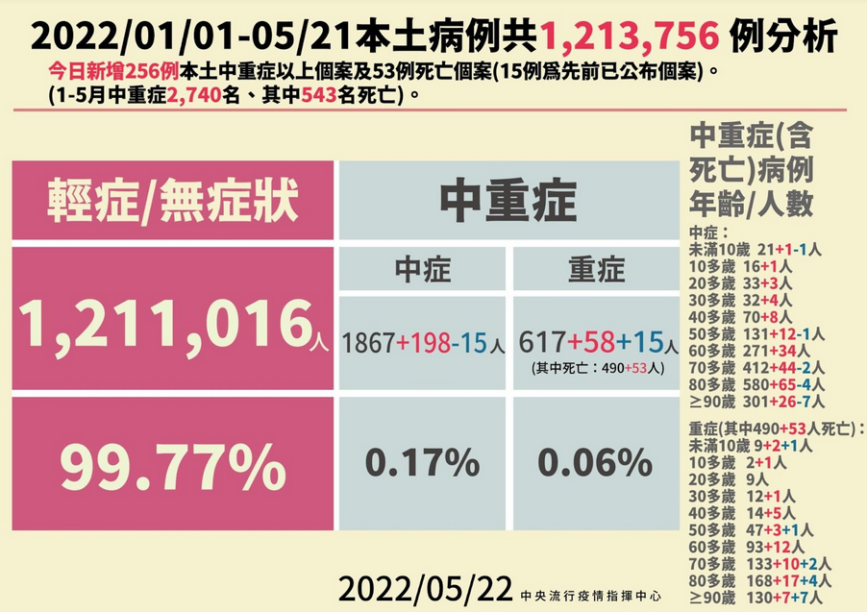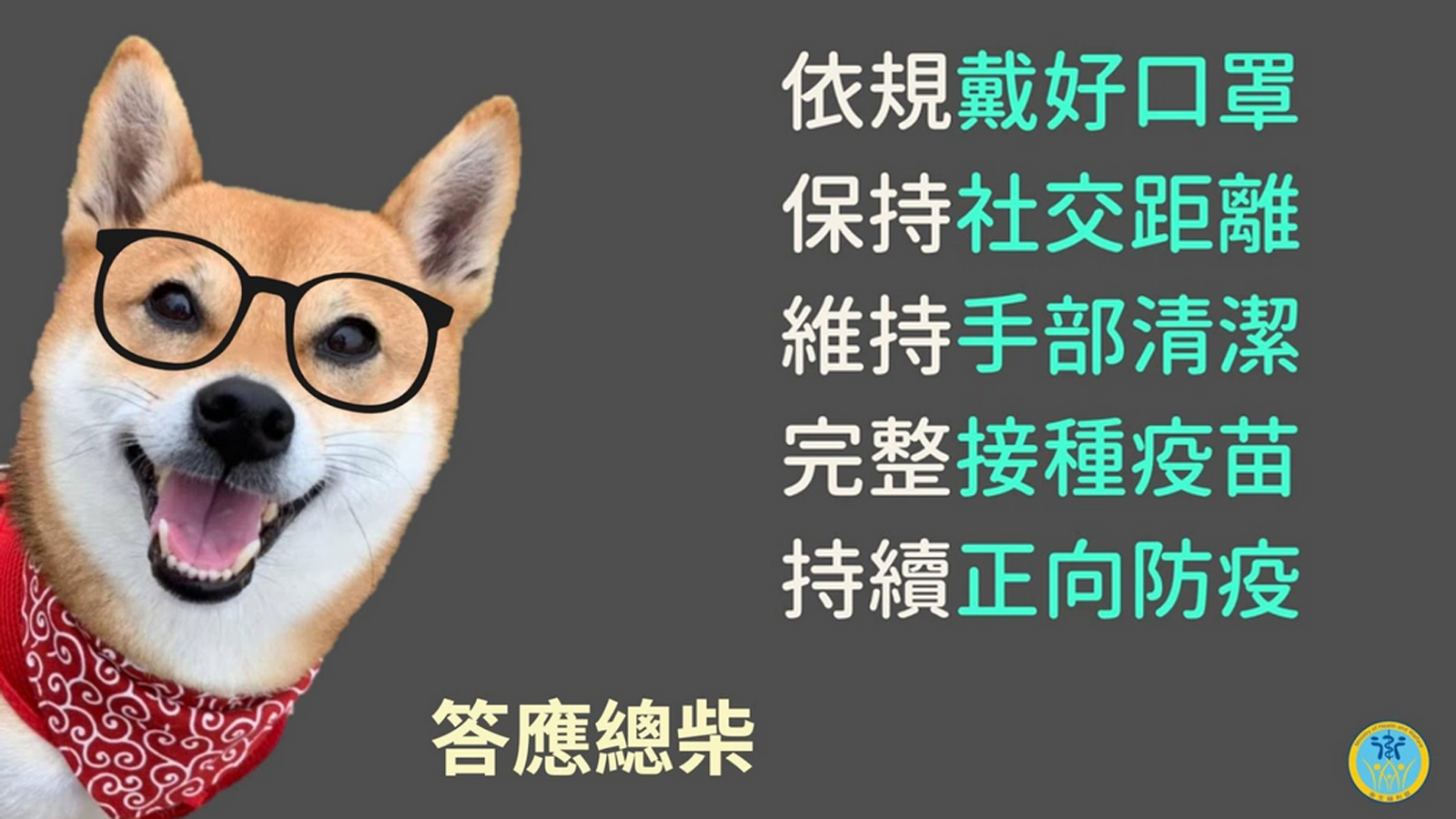Taiwan managed to keep free of COVID-19 for most of 2020. Everyday life remained essentially undisturbed for over a year, even as many of the world’s cities were enduring lockdowns, turmoil, widespread hospitalizations and mass death. In May 2021 Taiwan experienced its first major COVID-19 outbreak, which was contained by the end of September. At that point, there had been 842 total COVID deaths in Taiwan, a country of 26 million; by comparison, Sri Lanka, with its population of 22 million, had seen nearly 13,000 deaths, and in Italy—one of the earliest and hardest hit countries in the world—more than 131,000 people had died of COVID out of a population of 60 million.
Today, Taiwan, a nation that once panicked over case counts in the hundreds, is seeing tens of thousands of new COVID-19 infections daily. The Central Epidemic Command Center (CECC), which coordinates Taiwan’s response to COVID-19, estimates that cases will peak in early June, possibly rising as high as 100,000 infections per day.
Public sentiment—lulled, perhaps, into a sense of complacency by the country’s early success against the pandemic—now perceives the government as having lost control. However, the Taiwanese government could have sought to maintain a strict COVID-zero approach, had it so wished. Instead, the authorities deliberately shifted toward a strategy to manage COVID while preventing deaths, an approach made possible in part by the availability of effective new medications. The CECC refers to this as a “zero severe COVID” strategy.
According to statistics reported by the government, 99.77% of COVID cases in Taiwan are either asymptomatic or have light symptoms. At the time of writing, there are fewer than 2,000 cases of medium severity, and around 600 severe cases. Deaths have risen to the level of dozens daily, a significant proportion of whom have been unvaccinated individuals.
Lurid conspiracy theories have circulated online throughout the pandemic, including claims that the Tsai administration is covering up the true statistics, secretly burning dead bodies, and the like. Partisans of the Kuomintang—the former ruling authoritarian party favoring unification with China—are commonly older people, and particularly prone to believing such claims.
Having reported on the COVID-19 outlook in Taiwan for the duration, including 120 consecutive days of reporting on the government’s daily pandemic press conferences, I see no reason to disbelieve the official statistics. I live in Bangka, Taipei’s oldest and historically poorest district, which was the epicenter of the outbreak last year. Taipei’s first outbreak began among sex workers in my neighborhood, many of whom are undocumented immigrants from southeast Asian countries. My personal observation is that COVID has revealed inequalities in society more than anything else.
Back then, at a point in which the highest number of daily cases was just over five hundred, I heard ambulances around the clock. I live a stone’s throw away from Heping Hospital, where many cases were treated. The night market of “Snake Alley”, where there were a number of deaths among the elderly, is close by, too.
This time around, I’ve rarely heard anything except for the usual traffic.
Effectively, Taiwan is in the trickiest part of the pandemic–sticking the landing. Though in the early days borders were quickly closed, and a quarantine policy set up, there is no longer any real way to keep COVID outside Taiwan’s borders indefinitely. Even on an island, modern borders are porous, and some undocumented immigration is inevitable. The Coast Guard, for example, has intercepted vessels bearing passengers who were later found to have COVID.

So this was always going to be the endgame, once the newer, more infectious variants had begun to spread elsewhere in the world, and it became clear that COVID would be impossible to eradicate completely. It’s too rarely noted that the decision to reopen Taiwan, in a deliberate attempt to accommodate to coexisting with COVID-19, was not made only for the sake of reconnecting with the international economy. It became necessary in order to prevent future catastrophic outbreaks—or, at least, to mitigate them.
Recent COVID spikes Hong Kong and China were met with expansive lockdowns in urban centers such as Shanghai, with catastrophic results that demonstrated beyond a doubt the danger of attempting to maintain the COVID-zero approach beyond what was possible or advisable. Hospital systems were quickly overwhelmed as new strains of the virus tore through these unprotected populations like wildfire, with the result that Hong Kong reached the world’s highest COVID death rate.
Still, it is probable that many members of the Taiwanese public will not accept this necessary transition. After all, vaccination in Taiwan stalled around 80%, with many elderly individuals refusing to be vaccinated, having been discouraged by the conspiracy theories amplified by the pan-Blue Kuomintang camp, stoking fear of the danger and death that might occur due to vaccine side effects.
Much of the criticism of the Tsai administration has centered around the government’s failure to stock up on rapid tests,. The pan-Blue camp has sought to spread conspiracy theories there, too, alleging that the government kept out some vaccine brands and not others, or that the administration had investments in the vaccine brands that were made available.
The amplification of these conspiracy theories on primarily pan-Blue outlets such as CtiTV has fomented widespread distrust; in some individuals this distrust runs so deep that they refuse not only to be vaccinated, but even to be tested at all. It bears mentioning that CtiTV is owned by a media conglomerate that, according to the Financial Times, is taking direct input from the Chinese government on its editorial direction.
The aim now is to delay the spread of COVID so that it does not overwhelm Taiwan’s hospital system, stretching treatment capacity to the limit; these are the conditions in which high death rates have occurred elsewhere. With the number of cases remaining steady, it may take longer for Taiwan to see a peak period of the outbreak.
Taiwan thus finds itself in a strange position, raising new political questions for the future. Almost alone in avoiding lockdowns early in the pandemic, the Tsai administration will still be under attack from the Kuomintang opposition, though neither they nor any other government is likely to have managed the pandemic any better, had they been in power—since, again, this has long been the only possible endgame for COVID-19 in Taiwan. Yet there’s a real question whether dissatisfaction with the Tsai administration’s handling of the pandemic might cause enough citizens to throw their lot in with right-wing political forces in the upcoming elections later this fall.
Maybe what Taiwan needs is to find a path out that is neither that of the West, which simply relaxed preventive measures after a certain point of exhaustion, allowing COVID-19 to rip through the remaining vulnerable population, or of China, which attempted to maintain COVID-zero beyond what was rational, attempting to tout this as some sort of ideological superiority to the West, a strategy that came with its own deeply damaging results.
The fact that democratic Taiwan maintained COVID-zero very successfully for most of the pandemic clearly shows that COVID-zero is a tactic with no inherent link to any ideology, despite what the Xi regime in China, in linking its own political legitimacy to COVID-zero, is attempting to convey.
In any case, it appears that again, Taiwan is on its own unprecedented path to find its way out of the COVID-19 pandemic.





